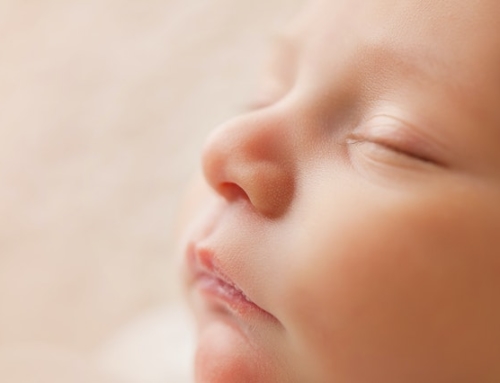
By: Tracy G. Cassels, Darcia Narvaez, Wendy Middlemiss, John Hoffman, Sarah Ockwell-Smith, Kathleen Kendall-Tackett, Helen Stevens
Infant sleep problems are some of the most common concerns reported by parents of young children. Ask any new parent and most will complain about lack of sleep. Many will also be worried that what they are experiencing isn’t “normal” and that they believe that their child has a problem that needs fixing. So they search books, ask friends and family or even their doctor about what to do about their child’s problematic sleep patterns. And to top it off, they feel immense anxiety and worry about it. Part of this epidemic of parental angst about children’s sleep is that we live in a culture in which parents are repeated told that they need to worry about their child’s sleep, that there will be dire consequences if their child doesn’t get enough sleep. Another problem is that most new parents, having had little experience with children prior to having their own, have little awareness about what truly is “normal” when it comes to infant sleep.
Simply being made aware of normal sleep patterns can help alleviate the stress and anxiety parents feel, leading to happier times for the entire family.
So what is normal?
In this series of posts, we’ll tackle some of the more common sleep concerns parents have with the hope that they can see them as normal, developmental stages for their child.
PART 1: THE CRITICAL ROLES OF FEEDING METHOD AND CHANGES IN DEVELOPMENT
“My child wakes every hour, all day and night, to feed”
Whether it’s every hour, or every two hours, or even three, parents are often concerned when their young infant is waking regularly for feedings. This concern is not surprising given the focus on “sleeping through the night” that our culture pushes. But sleeping through the night is not biologically normal, especially for a breastfeeding baby.
At the time of birth, a baby’s stomach can only hold a teaspoon’s worth of milk, meaning that he or she will need to feed frequently to meet the many demands for energy that accompany this period of growth. Although the stomach grows relatively quickly, the fat and protein content in human breastmilk is much lower than in the milk of other mammals and thus infants are required to feed often, resulting in greater night wakings (Ball, 2003; Ball, 2009).
Human breastmilk, being designed for infants who need to feed on cue day and night, is easily and quickly digested. Formula, however, is typically made from the breastmilk of another species – cows – and is higher in fat while also containing myriad additives which make it more difficult, and thus slower, to digest. This can affect infant sleep, resulting in unnaturally deeper infant sleep (more time spent in stage 3-4) (Butte, Jensen, Moon, Glaze, & Frost Jr., 1992), a stage of sleep for which it is most difficult to arouse to terminate breathing pauses (especially for arousal deficient infants), therein potentially diminishing the infants capacity to maintain sufficient oxygen. Even so, formula use does not necessarily providing parents with more sleep overall (Doan, Gardiner, Gay, & Lee, 2007).
Infants whose primary source of energy is breastmilk will often wake frequently to nurse, something that is essential for the breastfeeding relationship to continue (Ball, 2009). However, regardless of feeding status, many infants wake regularly during the night (Weinraub, Bender, Friedman, Susman, Knoke, Bradley, et al., 2012). Waking through the night is normal and biologically adaptive. In fact, though it is often reported that sleep patterns consolidate in the second year, the pattern differs in breastfed children.
Breastfeeding moms may wake more often, but report greater total sleep. For example in a study following breastfed children for 2 years, it was found that these children continue to wake frequently throughout the second year of life, a pattern more in line with cultures in which co-sleeping and full-term (aka “extended”) breastfeeding are more common (Elias, Nicolson, Bora, & Johnston, 1986).
Night wakings serve to protect the infant. Night wakings have been reported as being more common in infants who bedshare with a parent, yet the wakings and bedsharing (when done safely) may actually protect the infant from SIDS (Mosko, Richard, & McKenna, 1997; Mosko, Richard, McKenna, & Drummond, 1996). The critical period for SIDS is up to 8 months of age (with the peak at 2-3 months) and night wakings may serve as a protective mechanism. In fact, if we look at parenting historically and cross-culturally, frequent night-wakings coupled with co-sleeping and breastfeeding is the norm for which we should be comparing other infant sleep behaviours.
“My child was sleeping through the night and suddenly it’s stopped.”
Imagine you’ve been waking regularly with night feeds and arousals, but as time passes they are decreasing. Then you realize you’re now sleeping in nice, long chunks. Hours of sleep all at once! And it’s wonderful. Then suddenly, as quickly as it came, it’s gone. Your wonderful, sleeping-through-the-night child is suddenly waking again. This experience, which is a reality for many, can cause frustration and despair accompanied by the feeling that you’ve done something wrong, or that you must do something get their uninterrupted sleep back again.
But here’s the thing: You didn’t do anything. A return to night waking after periods of sleeping through the night is entirely normal. Many children’s sleep will cycle like this for a while. In fact, researchers looking at sleep patterns have found that often between 6 and 12 months, infants who had previously been sleeping long stretches suddenly start to wake more frequently at night (Scher, 1991; Scher, 2001). In fact, in one long-term study looking at child sleep between 3 and 42 months found that there was no stability in night wakings or even sleep duration during this time (Scher, Epstein, & Tirosh, 2004).
What causes the change in sleeping pattern? There are likely a variety of reasons, unique to each child. For some, it may be a growth spurt or teething. For others, it may be a cognitive leap that has them buzzing more so than usual or the appearance of separation anxiety. Just recently a study reported that babies tend to wake more often when they are learning to crawl. And for some, we may never know the actual reason. But as children age and each develops a circadian rhythm, they will go through cycles of sleep – some more convenient for parents than others. Parents need to be aware that these changes are entirely normal, even though they can be frustrating. Hopefully once you know that changes are to be expected, you can be better prepared or at least not add anxiety to the sleep disruptions you are forced to deal with once again.
Click here to read part two which focuses on the role of individual sleep patterns in infant sleep and why we need not worry when our child doesn’t fit what most other children are doing with respect to sleep.
Click here to read part three which focuses on normal parent and family behaviours and why it is not harmful to baby’s sleep.
____________________
Ball, H. L. (2003). Breastfeeding, bed-sharing, and infant sleep. Birth, 30, 181-188.
Ball, H. L. (2009). Bed-sharing and co-sleeping: research overview. NCT New Digest, 48, 22-27.
Butte, N. F., Jensen, C. L., Moon, J. K., Glaze, D. G., & Frost Jr., J. D. (1992). Sleep organization and energy expenditure of breast-fed and formula-fed infants. Pediatric Research, 32, 514-519.
Doan, T., Gardiner, A., Gay, C. L., & Lee, K. A. (2007). Breast-feeding increases sleep duration of new parents. Journal of Perinatal & Neonatal Nursing, 21, 200-206.
Elias, M. F., Nicolson, N. A., Bora, C., & Johnston, J. (1986). Sleep/wake patterns of breast-fed infants in the first 2 years of life. Pediatrics, 77, 322-329.
Mosko, S., Richard, C., & McKenna, J. (1997). Infant arousals during mother-infant bed sharing: Implications for infant sleep and sudden infant death syndrome research. Pediatrics, 100, 841-849.
Mosko, S., Richard, C., McKenna, J., & Drummond, S. (1996). Infant sleep architecture during bedsharing and possible implications for SIDS. Sleep, 19, 677-684.
Scher, A. (2001). Attachment and sleep: A study of night-waking in 12-month-old infants. Developmental Psychobiology, 38, 274-285.
Scher, A. (1991). A longitudinal study of night waking in the first year. Child: Care, Health and Development, 17, 295-302.
Scher, A., Epstein, R., & Tirosh, E. (2004). Stability and changes in sleep regulation: A longitudinal study from 3 months to 3 years. International Journal of Behavioral Development, 28, 268-274.
Weinraub, M., Bender, R. H., Friedman, S. L., Susman, E. J., Knoke, B., Bradley, R., Houts, R., & Williams, J. (2012). Patterns of developmental change in infants’ nighttime sleep awakenings from 6 through 36 months of age. Developmental Psychology, 48, 1511-1528.






I can't wait! 😀
Looking forward to part 2. Thanks! 😉
[…] Artículo original en Evolutionary Parenting […]
I always tell people- my husband wakes up several times a night to get a snack and I wake up at least once or twice to go to the bathroom, why in the world would we expect our tiny infant to sleep “better” than we do?
[…] Just FYI https://gku.flm.mybluehost.me/evolutionaryparenting.com/nor…-sleep-part-i/ […]
[…] https://gku.flm.mybluehost.me/evolutionaryparenting.com/normal-infant-sleep-part-i/ […]
[…] are like me and are persuaded by hard science, head over to Evolutionary Parenting and check out her excellent series on normal infant sleep – peer reviewed research folks – it’s good […]
[…] Normal Infant Sleep: Part I, Part II, & Part III […]
[…] What is Normal Infant Sleep? […]
[…] Normal Infant Sleep: Part I | Evolutionary Parenting | Where History And Science Meet Parenting. […]
[…] Grund dafür ist, dass Schlaflernprogramme kein Problem beheben – sondern höchstens ein Symptom. Dass Babys anders schlafen als Erwachsene, ist biologisch sinnvoll und normal. Und selbst wenn Babys tatsächlich Probleme mit dem Schlafen haben haben, ist ihr Schlaf selbst […]
[…] Normal infant sleep […]
[…] think it’s normal. And I think Calvin’s sleep habits are pretty normal too. This post helped me realize that. Cry it out is just one method and may not be right for us. This post does a […]
[…] https://gku.flm.mybluehost.me/evolutionaryparenting.com/normal-infant-sleep-part-i/ (vt sealt ka II ja III osa) […]
[…] hit sky high priority within weeks of bringing that baby home. So much stress and worry about what is or isn’t normal sleep behaviour for human babies can be avoided with a little […]
[…] Evolutionary Parenting […]
[…] Even though my baby did not exhibit any sleep problems (I follow the guidelines set out here by evolutionaryparenting). […]
[…] into sleep problems and sleep training or interventions but a solid grounding in what is truly normal from a biological, physiological, psychological and anthropological stand […]
[…] and base their beliefs around infant sleep and it is completely and utterly at odds with the way normal human infants behave when it comes to nursing and […]
[…] your baby cry or subject them to sleep training, I strongly ask you to do your homework on what normal infant sleep looks like, how it develops and what you can do besides sleep training to get through this time in […]
[…] basically, falling asleep after feeding is the biologically normal way for a baby to fall asleep and is present from birth, not something […]
[…] I had learned more about what normal infant sleep looked like, once I knew about the concept of breastsleeping, once I knew why it felt so very right […]
[…] It is biologically normal for a baby to wake and nurse frequently throughout the first year and beyond. It is not a sleep […]
[…] age (e.g., sleeping through the night by four months). They would encourage parents to learn about normal infant sleep so they have realistic expectations about infant […]
[…] age (e.g., sleeping through the night by four months). They would encourage parents to learn about normal infant sleep so they have more realistic […]
[…] real. Let’s be honest and let’s give new parents the very best chance to set themselves up with realistic expectations for the early time in their child’s life where they will be needed just as much at night as they […]
[…] step in being able to let go of what you think your baby should be doing is understanding what biologically normal infant and toddler sleep looks […]
[…] resetting and reestablishing the norms of infant sleep from a a biological and anthropological standpoint would be the first place to […]
[…] Parenting has a series of articles about Normal Infant Sleep that are well worth […]
[…] If you are concerned your baby isn’t getting the sleep she needs, first check your own expectations for normal infant sleep. […]
[…] evolutionaryparenting.com/normal-infant-sleep-part-i/ […]
[…] dominant view of infant and toddler sleep right now, is not a fair and accurate representation of what is normal and expected from a biological, psychological and anthropological […]
[…] • https://gku.flm.mybluehost.me/evolutionaryparenting.com/normal-infant-sleep-part-i/ […]
[…] https://gku.flm.mybluehost.me/evolutionaryparenting.com/normal-infant-sleep-part-i/ […]
[…] my first few weeks with Elan, I had no clue as to what normal infant sleep looked like. No clue. I thought I was supposed to put him down for naps in the dark, at certain […]
[…] Normal Infant Sleep, Part 1 from Evolutionary Parenting […]
[…] Babies are designed to wake frequently throughout the night to feed. While babies who are fed formula can certainly still wake up throughout the night, breastfed babies are especially wired to wake up throughout the night. The fat and protein content of human milk is lower than that of other animals, which means that a breastfed baby will often wake more frequently for feedings. Infant formula digests more slowly than breast milk, and it can lead baby to fall into deep sleep in which they do not naturally arouse from easily. These frequent nighttime feedings are essential for maintenance of the breastfeeding relationship and milk supply. Sleeping through the night is not biologically normal. […]
My baby sleeps on top of me at night. When she is hungry, she starts to “breast crawl” (moving her head in search of the breast and pushing her legs) while asleep, which wakes me up and I help her to latch. She sucks while asleep (“dream feeding”). In this way, she has been sleeping through the night (~10-12h) since I started doing that (around week 3, and now she is 9w old). She wakes up with ~50% chance when I change her diapers in the middle of the night, but falls back to sleep pretty quickly.
Also, my baby is developing very well, my midwife was always impressed by us when she visited. I couldn’t find anything similar to what I’m doing, so I post here to share my experience.
[…] Know that you didn’t do anything wrong. It’s not the norm for your baby’s sleep to stay the same at any given time for awhile.https://evolutionaryparenting.com/normal-infant-sleep-part-i/ […]